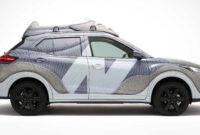Technology has become an important part of the modern car. These days, you’d be hard pressed to find a car on the road that doesn’t have electronics. And now, an experiment is ending with the goal of using technology to end traffic congestion and improve overall mobility.
Nissan North America, along with the Circles Consortium of researchers from Vanderbilt University, UC Berkeley, Temple University, and Rutgers University-Camden, are coordinating with the Tennessee Department of Transportation on an experiment aimed at increasing fuel economy and improving traffic.
Five days of open-lane testing was conducted from November 14 to 18 on a newly opened, sensor-filled section of US Interstate 24 called I-24 Motion.

5 Photo
Using 100 specially equipped Nissan Rogues, the experiment wanted to test an AI-enabled cruise control system and see how it affects the speed and driving behavior of nearby cars.
Preliminary findings see that a single AI-equipped vehicle can cause a positive ripple effect to help smooth out human-caused traffic jams among 20 nearby cars. The next few months will be used by the Circles team to analyze data from a five-day trial on the I-24 Motion “smart highway.”
Of note, the I-24 Motion is the only real-world automotive testing environment of its kind in the world. It stretches four miles southeast of downtown Nashville, equipped with 300 4K digital sensors capable of recording data on 260 million vehicle miles per year.
On November 16 alone, the system logged a total of 143,010 driving miles and 3,780 driving hours.
“The I-24 Motion System, combined with the vehicle energy model developed in the Circles project provides an estimate of the fuel consumption of the entire traffic flow during these hours. The concept we want to demonstrate is to utilize this new traffic system to collect data and forecast traffic and applying artificial intelligence technology to existing cruise control systems, we can reduce traffic congestion and improve fuel economy,” said the Circles team in a joint statement.
Motion I-24 is a permanent infrastructure, which means the testbed will always be available for researchers. Toyota North America and General Motors also supported a five-day trial in November, providing two additional test units: the Toyota RAV4 and Cadillac XT5.




